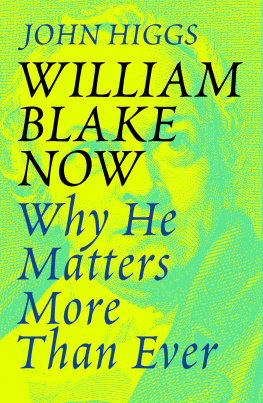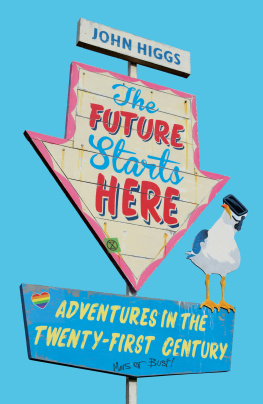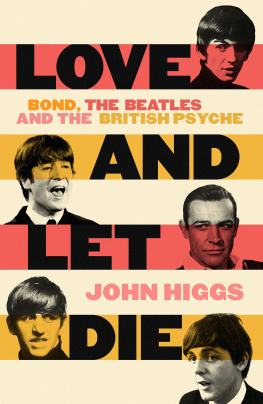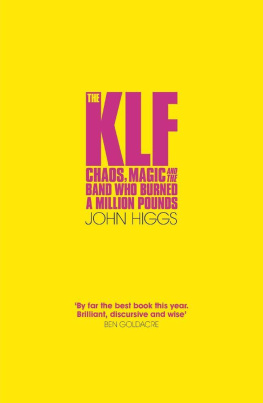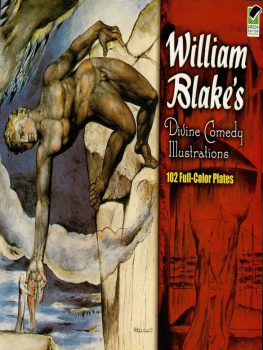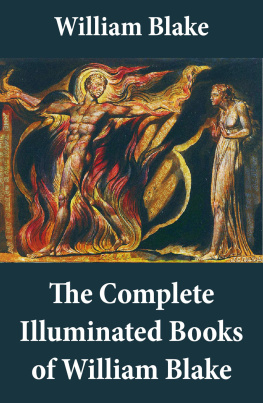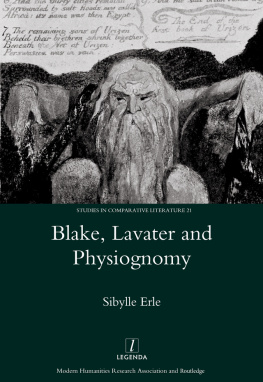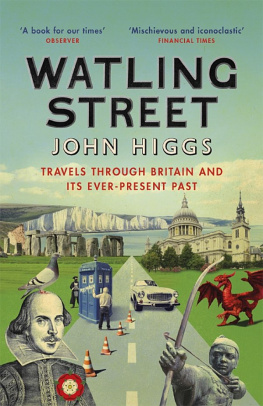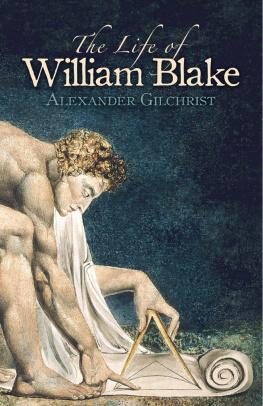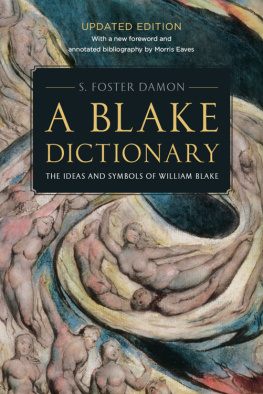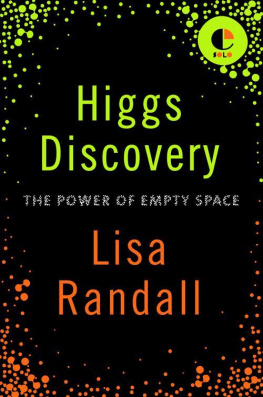John Higgs - William Blake Now: Why He Matters More Than Ever
Here you can read online John Higgs - William Blake Now: Why He Matters More Than Ever full text of the book (entire story) in english for free. Download pdf and epub, get meaning, cover and reviews about this ebook. year: 2019, publisher: Weidenfeld & Nicolson, genre: Religion. Description of the work, (preface) as well as reviews are available. Best literature library LitArk.com created for fans of good reading and offers a wide selection of genres:
Romance novel
Science fiction
Adventure
Detective
Science
History
Home and family
Prose
Art
Politics
Computer
Non-fiction
Religion
Business
Children
Humor
Choose a favorite category and find really read worthwhile books. Enjoy immersion in the world of imagination, feel the emotions of the characters or learn something new for yourself, make an fascinating discovery.
- Book:William Blake Now: Why He Matters More Than Ever
- Author:
- Publisher:Weidenfeld & Nicolson
- Genre:
- Year:2019
- Rating:5 / 5
- Favourites:Add to favourites
- Your mark:
- 100
- 1
- 2
- 3
- 4
- 5
William Blake Now: Why He Matters More Than Ever: summary, description and annotation
We offer to read an annotation, description, summary or preface (depends on what the author of the book "William Blake Now: Why He Matters More Than Ever" wrote himself). If you haven't found the necessary information about the book — write in the comments, we will try to find it.
William Blake Now: Why He Matters More Than Ever — read online for free the complete book (whole text) full work
Below is the text of the book, divided by pages. System saving the place of the last page read, allows you to conveniently read the book "William Blake Now: Why He Matters More Than Ever" online for free, without having to search again every time where you left off. Put a bookmark, and you can go to the page where you finished reading at any time.
Font size:
Interval:
Bookmark:
For Brian Barritt (19342011)

Nick Duncan, the treasurer of The Blake Society, stands on a park bench in Bunhill Fields and looks at the sea of faces before him. Theres a little more than the fifty or so people we were expecting, he says, somewhat nervously. Those at the back of the vast crowd before him struggle to make out what he is saying. There is no microphone or public address system. No one had thought they would be necessary.
It is 12 August 2018 and the 191st anniversary of the death of the eighteenth-century poet, artist and printer William Blake. Blake was the author of such famous poems as The Tyger and illuminated books such as Jerusalem, but during his lifetime he was mocked, ignored and pitied. He was written off as crazy, as much for his disturbing work as for his claims to see and converse with angels. After a lifetime of near poverty he was buried in a cheap, unmarked grave at the Bunhill Fields dissenters graveyard in London, and the exact position of his remains was forgotten. Nearly two centuries later, the religious and political turmoil that fed his work has passed into irrelevancy. What could such a figure have to offer us here in the twenty-first century? Why would anyone care about William Blake now?
Yet here I am, drawn to this spot along with many hundreds of others, to witness the unveiling of Blakes new grave marker. Recent detective work has convincingly pinpointed the location of his remains and The Blake Society has raised money for a memorial a flat piece of Portland stone, carved by the stonecutter Lida Cardozo Kindersley and set into the grass rather than standing tall like a gravestone.
The unveiling was not ticketed and there was no charge to attend. It was barely advertised. I heard about it from a tweet by The Blake Society, which gave details of the time and place, along with words: All are welcome! Who could predict, in this modern age, how many people would assemble to witness the reveal of a new grave marker for a long-dead Georgian poet? Who would have expected the arrival of such huge crowds?
Looking around at the people who felt compelled to attend, I am struck by how hard to categorise they are. They seem to come from every sector of society. I see an elderly gent in a Barbour jacket and flat cap standing next to a teenage girl in a Metallica T-shirt. There is a lot of white hair, but there is pink hair also. The crowd seems to be roughly equally male and female, with a greater mix of ethnicities than I had expected. Small children run around the edges, while room is made for frail and elderly people who have made the effort to be here. Famous faces are scattered throughout the crowd. I realise with a shock that I am facing Philomena Cunk, also known as the comedian Diane Morgan, and I think I briefly see the actress Zo Wanamaker.
I try to recall if I have ever been part of such a genuinely diverse crowd, because there is something unreal about seeing this collection of people together. It feels like we have been assembled for the purposes of an advert, and that the crowd has been deliberately engineered to exploit a half-remembered nostalgic ideal. We are in the middle of the Brexit years, a time of cultural and political division. The tribes dont mix like this anymore. And yet, here we all are. As The Blake Society declared all are indeed welcome.
Blakes ability to reach across society like this is extremely unusual. His words to the hymn Jerusalem have become the unofficial English national anthem, belted out with gusto by the flag-waving patriotic crowd at the finale of the Last Night of the Proms. The hymns establishment credentials are strengthened through its adoption by the English cricket team and the Womens Institute, and its words were used by the post-war Labour prime minister Clement Attlee, one of the creators of the NHS and the welfare state, to describe the vision of Britain he was trying to build. Yet Blake is just as likely to be championed by anti-establishment figures such as Allen Ginsberg, Patti Smith or Billy Bragg, or played by colliery brass bands in solid working-class areas. What other artists can boast claims by both the establishment and the counterculture like this? Those who speak to the crowd ahead of the stones unveiling include an academic, a theologian, the Rector of St James Church, a punk poet, a comedian and a multi-millionaire heavy metal vocalist. The money to pay for the stone was raised by a benefit concert organised by the comedian Stewart Lee. It is strange that when a gravestone is needed for one of Britains most notable poets of genius, the task of raising the money for it falls to a stand-up comedian.
There are marketing executives who would bottle Blakes secret, if only they could understand it. Businesses and artists invest a huge amount of effort in trying, and failing, to attract everybody. The wisdom of the age tells us that this can only be done by producing things that dont need imagination to be enjoyed. As the philosopher Chris Bateman wrote in 2010, talking about videogame design, In general terms, you can count on the formula greater imagination required, smaller number of people attracted. This formula explains the gulf between critical and commercial success in publishing, music, movies and many other fields, but it does not explain Blake. His appeal suggests that the opposite is true. His extraordinary, otherworldly work requires our imagination to appreciate it fully, often in quantities greater than most of us can provide. In theory, this should have condemned him to obscurity. Yet this strangely diverse crowd suggests that there is something about Blake that is important, and perhaps particularly so in times of division.
In January 2011, I visited the English Beat writer Brian Barritt in a south London hospital, just a few days before he died. He told me how the doctor had come to check on him early that morning and found him sat up in bed, singing and looking through a book of William Blakes artwork. The doctor, who had given Brian a terminal diagnosis the previous afternoon and told him that he only had days to live, viewed this behaviour as odd.
He kept asking if I remembered him and what he told me yesterday, Brian said. I explained that yes, I did. Its not the sort of conversation you forget. But he kept looking at me as if I didnt understand. Brian shook his head. Honestly, John, where do you start with someone like that?
For most people, this doctor would be an admirable figure. He was respected, experienced and worked long hours in an extremely emotionally challenging position for the good of the people of London. But to Brian, the fact that he couldnt understand that a man preparing to die would spend his last days reading Blake and singing meant that the doctor had gone wrong on a very profound level.
Towards the end of the Bunhill Fields gravestone unveiling, Brian comes to mind when I get the opportunity to place a candle at the side of the gravestone. I do this for him as much as for myself, for it was Brian who sparked my interest in Blake and insisted that I read him. Bending down with this small, flickering light, I am able to study the grave up close. Here lies WILLIAM BLAKE 17571827, it reads, Poet Artist Prophet. That Blakes genius is considered to lie equally in his work as a visual artist and in his written words is, like his ability to be part of the establishment and the counterculture, an extremely rare quality that few others can claim.
Close to the stone, I notice a golden star carved between the words Poet and Artist. The star is so small that you are unlikely to notice it on photographs. It reminds me of an illustration from Blakes epic work
Next pageFont size:
Interval:
Bookmark:
Similar books «William Blake Now: Why He Matters More Than Ever»
Look at similar books to William Blake Now: Why He Matters More Than Ever. We have selected literature similar in name and meaning in the hope of providing readers with more options to find new, interesting, not yet read works.
Discussion, reviews of the book William Blake Now: Why He Matters More Than Ever and just readers' own opinions. Leave your comments, write what you think about the work, its meaning or the main characters. Specify what exactly you liked and what you didn't like, and why you think so.

